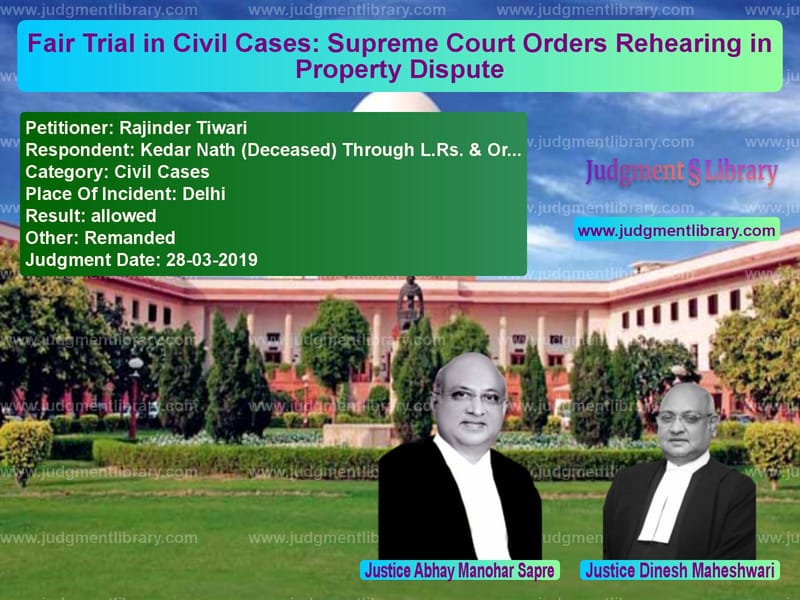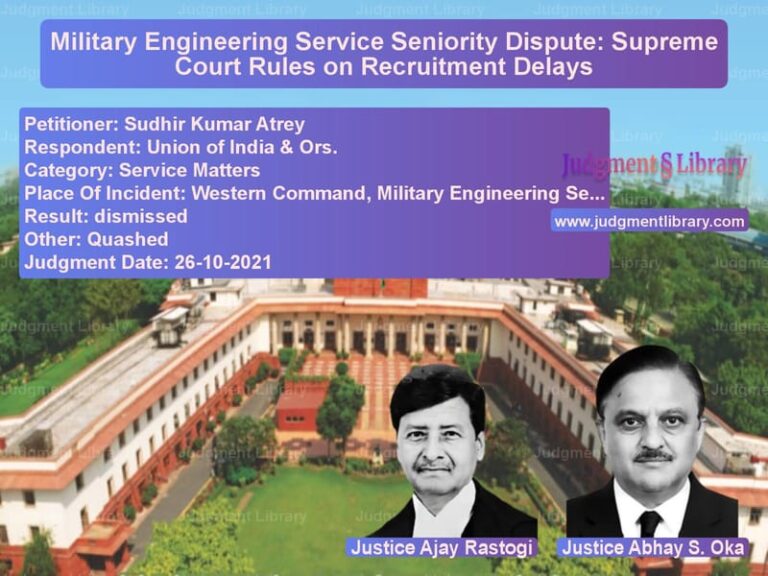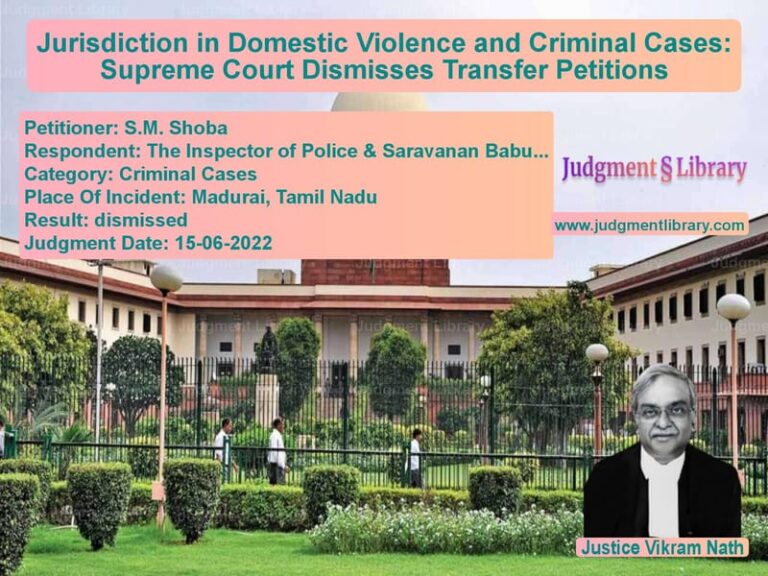Fair Trial in Civil Cases: Supreme Court Orders Rehearing in Property Dispute
The case of Rajinder Tiwari vs. Kedar Nath (Deceased) Through L.Rs. & Ors. revolves around the issue of fair trial and procedural fairness in civil disputes. The Supreme Court of India, in its judgment dated March 28, 2019, examined whether the defendant was denied a fair opportunity to present his case due to procedural lapses and whether the case should be remanded for fresh trial.
The appellant, Rajinder Tiwari, had filed a civil suit for a permanent injunction in relation to the suit property before the Senior Civil Judge-cum-Rent Controller, Karkardooma Courts, Delhi. The trial court ruled in his favor, and the first appellate court upheld the decision. However, the Delhi High Court set aside these judgments and dismissed the suit, prompting an appeal to the Supreme Court.
Background of the Case
Rajinder Tiwari, the plaintiff, filed Civil Suit No. 147 of 2007 against the original defendant, Kedar Nath, seeking a permanent injunction concerning the suit property. The suit was contested, but procedural irregularities led to an ex-parte decree being passed in favor of the plaintiff.
During the trial proceedings:
- The defendant’s right to file a written statement was closed due to procedural lapses.
- The defendant was unable to file any documentary evidence in support of his case.
- The plaintiff proceeded with his evidence, while the defendant could only cross-examine the witnesses.
The Senior Civil Judge decreed the suit in favor of the plaintiff on February 1, 2010. The defendant challenged this decree before the Additional District Judge, but the first appellate court dismissed the appeal on July 26, 2010. Thereafter, the defendant filed a second appeal before the Delhi High Court, which allowed the appeal and dismissed the plaintiff’s suit on November 3, 2016. An application for rehearing was also dismissed on April 26, 2017, leading to the present appeal before the Supreme Court.
Legal Issues Raised
- Whether the defendant was denied a fair opportunity to present his case due to procedural lapses.
- Whether the High Court was justified in dismissing the suit based on an incomplete record.
- Whether the case should be remanded for a fresh trial to allow both parties a fair hearing.
Arguments by the Petitioner (Rajinder Tiwari)
The petitioner argued:
- That the trial and appellate courts had correctly ruled in his favor based on the available evidence.
- That the defendant had failed to comply with procedural requirements and had lost his right to file a written statement due to his own negligence.
- That the High Court erred in dismissing the suit outright without properly examining the factual matrix.
- That procedural delays and technical objections should not override the substantive merits of the case.
Arguments by the Respondent (Legal Representatives of Kedar Nath)
The respondents countered:
- That the defendant was denied a fair opportunity to present his case as his right to file a written statement was wrongly closed.
- That the principles of natural justice required that the defendant be given a chance to present his case fully.
- That the trial court’s decision was based on incomplete evidence and was therefore liable to be set aside.
- That the High Court correctly recognized the procedural unfairness and dismissed the plaintiff’s suit.
Supreme Court’s Judgment
The Supreme Court ruled in favor of the appellant, holding that:
- The trial had not been conducted satisfactorily, as the defendant was not afforded an adequate opportunity to file a written statement.
- Since the defendant could not adduce documentary evidence, his case was prejudiced.
- Both the trial court and the first appellate court ruled on an incomplete record, while the High Court dismissed the suit without a proper evaluation of all facts.
- The principles of natural justice require that both parties be given an equal opportunity to present their case.
The Court noted:
“A decision rendered by the Courts in an unsatisfactory conducting of the trial is not legally sustainable, regardless of whose favor the decision is rendered.”
Accordingly, the Supreme Court set aside the High Court’s order and remanded the matter to the Senior Civil Judge for a fresh trial.
Key Takeaways from the Judgment
- Fair trial is a fundamental right: All contesting parties must be given a fair opportunity to present their case.
- Procedural fairness cannot be ignored: Even if a party fails to comply with procedural requirements, courts must ensure that substantive justice is not compromised.
- Remand for fresh trial is justified when procedural lapses deny a party a fair opportunity to present evidence.
- Courts should avoid deciding cases on technicalities and focus on substantive justice.
Conclusion
The Supreme Court’s decision in Rajinder Tiwari vs. Kedar Nath reinforces the importance of procedural fairness in civil litigation. By remanding the case for a fresh trial, the Court ensured that both parties would have an equal opportunity to present their case. This judgment serves as a crucial precedent for cases where procedural lapses may lead to unfair decisions.
Petitioner Name: Rajinder Tiwari.Respondent Name: Kedar Nath (Deceased) Through L.Rs. & Ors..Judgment By: Justice Abhay Manohar Sapre, Justice Dinesh Maheshwari.Place Of Incident: Delhi.Judgment Date: 28-03-2019.
Don’t miss out on the full details! Download the complete judgment in PDF format below and gain valuable insights instantly!
Download Judgment: Rajinder Tiwari vs Kedar Nath (Deceased Supreme Court of India Judgment Dated 28-03-2019.pdf
Direct Downlaod Judgment: Direct downlaod this Judgment
See all petitions in Property Disputes
See all petitions in Specific Performance
See all petitions in Judgment by Abhay Manohar Sapre
See all petitions in Judgment by Dinesh Maheshwari
See all petitions in allowed
See all petitions in Remanded
See all petitions in supreme court of India judgments March 2019
See all petitions in 2019 judgments
See all posts in Civil Cases Category
See all allowed petitions in Civil Cases Category
See all Dismissed petitions in Civil Cases Category
See all partially allowed petitions in Civil Cases Category







